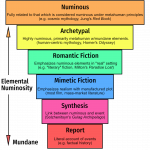Category: Writer Advice (page 3)
A Metahuman Theory of Literature
Respect Your Audience by Dumbing Down
Choosing a Subject: Resolution
The resolution of a work is critical for its success.
The theme and message of the work need to carry through to the end of a story. Even for fiction writers who focus on mere entertainment, a resolution provides satisfaction to the audience.
Without a resolution, a story feels incomplete, and that’s undesirable in all but very specific circumstances.
This is the fourth part of my series on how to narrow down subjects for writing (see the rest through this link).
Choosing a Subject: Crisis
The crisis is the ultimate point of tension in a literary work. It’s when the big bad guy and the big good guy face off, and to the victor go the spoils.
If you want to write a story, you need a good crisis point.
In fact, when you leave a story feeling unfulfilled, it’s almost certainly because the climactic moment of the story didn’t live up to its role.
This is the third part in my series about narrowing down subjects for a creative writing project. Previously I discussed this with the initiation and development of a story.
Choosing a Subject: Development
This is the second part of my overview of how to choose a subject for a story. My belief is that the best way to do this is to look at the various parts of the story from the perspective of finding the pieces before you begin, and finding authenticity.
You can find these elements in a plot or a character, so you aren’t tied into a dogmatic way of viewing the central mode of a story. This is a process of elimination: if you can’t find these things, your story is likely to have issues down the road.
Choosing a Subject: Initiation
The greatest challenge an author faces when preparing to write is choosing a worthwhile subject for their work.
This may seem trivial at the moment of conceiving, but having a faulty premise kills works-in-progress in their tracks and manifests in various problems difficult to track back to their source.
I don’t have an orthodox method for selecting a subject in mind: if you’re a plot-focused writer or a character-focused writer (Jeff Gerke writes about this in his Plot Versus Character), you will start from a different point. I often work around a theme or motif and take some time to figure out the subject once I’ve developed the message, but I’m cerebral in my approach to stories because of my background as a teacher.
Ultimately, choosing a subject will come down to the personality, proclivity, and aptitude of the writer. However, you can rule out poor subjects by applying a simple test.
Writing Advice and You
While working on my MFA, I read something like a half-dozen different full-length books on writing from the perspective of highly successful authors (King, Lamott, Mailer, and McPhee stand out), and the program included more snippets, lectures, interviews, and round-tables on writing.
One challenge that I had to overcome immediately was figuring out how to sort and filter information.
People have a limited ability for information intake and storage, and a limited ability to convert stored information into practice.
So, what’s the best way to look at writing advice?
One Word at a Time
This is perhaps the least original title for advice to writers, but it’s the fundamental piece of advice that has helped me write.
And I take it differently than most.
How each writer will achieve success is ultimately a deeply individual process. Different inspirations can drive writing, and personality plays a role in determining workflow and process.
But there is one trait that I’ve observed repeatedly as I watch writers and as I read writers’ work on writing.
They read one word at a time.

